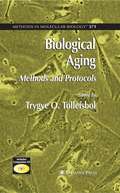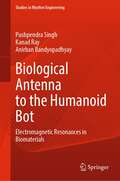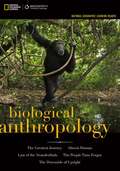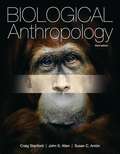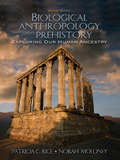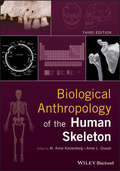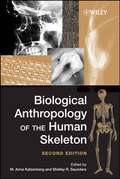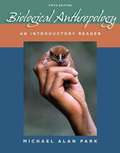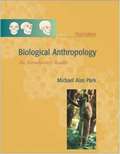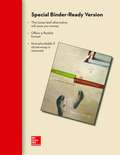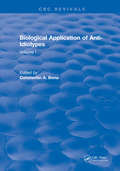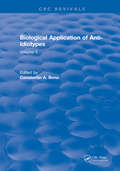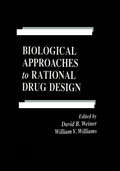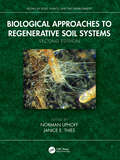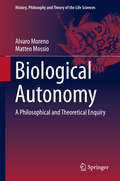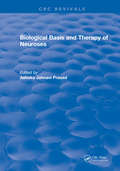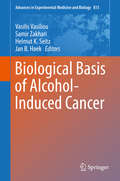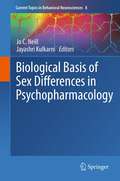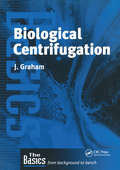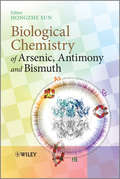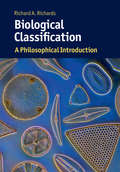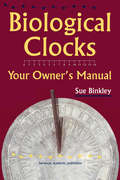- Table View
- List View
Biological Aging: Methods and Protocols (Methods in Molecular Biology #371)
by Trygve O. TollefsbolThis book investigates the various processes that are affected by the age of an organism. Several new tools for the analysis of biological aging have been introduced recently, and this volume provides methods and protocols for these new techniques in addition to its coverage of established procedures. Researchers seeking new technology and techniques will find this volume of tremendous benefit as they move towards new directions.
Biological Antenna to the Humanoid Bot: Electromagnetic Resonances in Biomaterials (Studies in Rhythm Engineering)
by Kanad Ray Anirban Bandyopadhyay Pushpendra SinghThe book outlines a pathway to the development of fusion of electromagnetic resonance and artificial intelligence which will dominate the world of communication engineering. Electromagnetic resonance is fundamental to all biomaterials. The authors explore the peculiarities of this typical resonance behaviour in the literatures and provide the key points where the research should direct. Biological antennas are inspiring designing of several electromagnetic devices. From biomimetic engineering to humanoid bots a revolution is undergoing. Authors include entire development in the form of a book along with their contribution to this field.
Biological Anthropology
by National Geographic Learning StaffBring your learning to life with compelling images, media and text from National Geographic. National Geographic Reader: Biological Anthropology will help you develop a clearer understanding of the world around you through engaging content.
Biological Anthropology (3rd Edition)
by John S. Allen Craig Stanford Susan C. AntonDiscover the Best of Biological Anthropology: From its Earliest Foundations to its Most Current Innovations Biological Anthropology, 3/e is written to appeal to a wide range of students. It continues to build upon the strength and success of its first and second editions by integrating the foundations of the field with the most current innovations happening today. Over the past 40 years, biological anthropology has rapidly evolved from the study of physical anthropology into biological anthropology. Biological anthropology is now an integrative combination of information from the fossil record and the human skeleton, genetics of individuals and of populations, our primate relatives, human adaptation, and human behavior. The third edition of Biological Anthropology combines the most up-to-date, comprehensive coverage of the foundations of the field with modern innovations and discoveries. Teaching and Learning Experience Personalize Learning - MyAnthroLab delivers proven results in helping students succeed, provides engaging experiences that personalize learning, and comes from a trusted partner with educational expertise and a deep commitment to helping students and instructors achieve their goals. Improve Critical Thinking - Visual summaries, critical thinking questions, Insights and Advances boxes and author suggested readings found within each chapter encourage students to examine assumptions, discern hidden values, evaluate evidence, assess conclusions, and more!
Biological Anthropology and Prehistory: Exploring Our Human Ancestry
by Norah Moloney Patricia C. RiceWritten specifically for courses that cover biological anthropology and archaeology, this superbly illustrated new text offers the most balanced and up-to-date introduction to our human past. Devoting equal time to biological anthropology and prehistory, this text exposes students to the many sides of major controversial issues, involving students in the scientific thought process by allowing them to draw their own conclusions. Amidst discussions of bones and artifacts, the text maintains a focus on people, demonstrating to students how biological anthropology and archaeology apply to their lives today. Featuring the latest research and findings pulled from the original sources, this new text is far and away the most up-to-date text available. In addition, the superior art program features hundreds of photographs and figures, and the multimedia presentation options include documentary film clips and lecture launcher videos. Pat Rice, a recipient of AAA’s Outstanding Teacher Award and past-president of the General Anthropology Division of AAA, and Norah Moloney, an experienced professor and active archaeologist, present the material in a clear, refreshing, and straightforward writing style.
Biological Anthropology of the Human Skeleton
by M. Anne Katzenberg Anne L. GrauerAn Indispensable Resource on Advanced Methods of Analysis of Human Skeletal and Dental Remains in Archaeological and Forensic Contexts Now in its third edition, Biological Anthropology of the Human Skeleton has become a key reference for bioarchaeologists, human osteologists, and paleopathologists throughout the world. It builds upon basic skills to provide the foundation for advanced scientific analyses of human skeletal remains in cultural, archaeological, and theoretical contexts. This new edition features updated coverage of topics including histomorphometry, dental morphology, stable isotope methods, and ancient DNA, as well as a number of new chapters on paleopathology. It also covers bioarchaeological ethics, taphonomy and the nature of archaeological assemblages, biomechanical analyses of archaeological human skeletons, and more. Fully updated and revised with new material written by leading researchers in the field Includes many case studies to demonstrate application of methods of analysis Offers valuable information on contexts, methods, applications, promises, and pitfalls Covering the latest advanced methods and techniques for analyzing skeletal and dental remains from archaeological discoveries, Biological Anthropology of the Human Skeleton is a trusted text for advanced undergraduates, graduate students, and professionals in human osteology, bioarchaeology, and paleopathology.
Biological Anthropology of the Human Skeleton
by M. Anne Katzenberg Shelley R. Saunders"This book is virtually required reading for biological anthropologists and will be a useful, up-to-date primer on osteological analyses for a wider audience."--The Quarterly Review of Biology, March 2009"... a comprehensive guide to the ever-changing discipline of physical anthropology... provides an in depth introduction to human skeletal biology. The structure of the book makes it easy for the reader to follow the progression of the field of human skeletal biology."--PaleoAnthropology, 2009 IssueThe First Edition of Biological Anthropology of the Human Skeleton is the market-leading reference and textbook on the scientific analysis of human skeletal remains recovered from archaeological sites. Now, featuring scores of new or thoroughly revised content, this Second Edition provides the most comprehensive and up-to-date coverage of the topic available.Like the previous edition, this Second Edition is organized into five parts with contributing chapters written by experts in the field of human skeletal biology: Part One covers theory and application; Part Two discusses morphological analyses of bone, teeth, and age changes; Part Three reviews prehistoric health and disease; Part Four examines chemical and genetic analysis of hard tissues; and Part Five closes with coverage of quantitative methods and population studies. Each chapter includes a review of recent studies, descriptions of analytical techniques and underlying assumptions, theory, methodological advances, and speculation about future research.New or thoroughly revised content includes:Techniques in the analysis of human skeletal and dental remainsExtensive coverage of new technologies, including modern morphometric techniquesAdvances in the field of forensic anthropologyEnhanced discussion of ethical terms regarding the study of aboriginal peoples' remains where those people are no longer the dominant cultureThis book serves as an indispensable research guide to biological anthropologists, osteologists, paleoanthropologists, and archaeologists. Now with a stronger focus on teaching complex material to students, this revised edition provides enhanced case studies and discussions for future directions, making it an invaluable textbook for advanced undergraduates and graduate students in biological anthropology and forensic anthropology programs.
Biological Anthropology: An Introductory Reader
by Michael Alan ParkThis supplementary reader offers both historical and contemporary articles that demonstrate the nature and significant contributions of biological anthropology. With nearly one-third of the selections focusing on living populations, the 42 readings cover the entire range of bioanthropological studies: evolution, nonhuman primates, human paleontology, and modern human groups. Eleven of the articles are new to this edition, including Adam Summer's "Born to Run," Kate Wong's "The Littlest Human," James J. McKenna's "Babies Need Their Mothers Beside Them," and Michael Balter's "Are Humans Still Evolving?"
Biological Anthropology: An Introductory Reader 3rd ed.
by Michael Alan ParkThis supplementary reader demonstrates the significant contributions made by biological anthropology.
Biological Anthropology: Concepts and Connections
by Agustín FuentesBiological Anthropology: Concepts and Connections shows the relevance of anthropological concepts to today's students and encourages critical thinking. Throughout the text and especially in its many “Connections” features, Agustin Fuentes links anthropological concepts and questions to students’ lives. One of the top scholars in the field of biological anthropology, Agustin Fuentes’ current research looks at the big questions of why humans do what they do and feel the way they feel. He is committed to an integrated, holistic anthropological approach. Fuentes wrote this text to help answer the “so what” questions and make anthropological knowledge relevant to everyday life.
Biological Application of Anti-Idiotypes: Volume I
by Constantin A. BonaThe goal of this book is to present findings which are supportive of the concept that the words of the idiotype dictionary and likewise self-recognition are essential for communication between lymphocyte clones while some unfaithful ( infidel ) copies of the words contained in the idiotype dictionary perhaps play a role in the functional regulation of nonlymphoid cells.
Biological Application of Anti-Idiotypes: Volume II
by Constantin A. BonaThe goal of this book is to present findings which are supportive of the concept that the words of the idiotype dictionary and likewise self-recognition are essential for communication between lymphocyte clones while some unfaithful ( infidel ) copies of the words contained in the idiotype dictionary perhaps play a role in the functional regulation of nonlymphoid cells.
Biological Applications of Nanoparticles
by Biplab Sarkar Avinash SonawaneThis textbook for graduate and postgraduate students provides comprehensive applications of nanoparticles in medicine, agriculture, and environmental sciences. The initial chapter covers basic topics related to types, synthesis, structure, and properties of various nanoparticles. It further discusses the wide range of applications of nanoparticles in medicine, agriculture, and the environment. The book presents nano-electronic biosensors that are used to diagnose and monitor the progression of human diseases. It summarizes the opportunities and challenges of nanotechnology in the agriculture and food sector highlighting the scientific, technical, regulatory, safety, and societal impacts. Additionally, it illustrates the applications of nanotechnology in the field of aquaculture medicine, bioinformatics and food technology. The textbook examines the development and administration of nano-medicines , their applications, advantages, and limitations for the treatment and prophylaxis of a broad range of diseases. Lastly, the textbook explores the recent advances in the field of nanobusiness and nanotechnology issues in intellectual property management( IPR).
Biological Approaches in Dye-Containing Wastewater: Volume 1 (Sustainable Textiles: Production, Processing, Manufacturing & Chemistry)
by Subramanian Senthilkannan Muthu Ali KhadirThe textile industry segment has been continuously expanding and it is reported that the global market was US$1000 billion in 2020. Aside from the fact that textile industry could be profitable and offers several advantages for human life, this industry produces wastewater containing many harmful substances in the form of organic and inorganic moieties. Textile wastewater can lead to serious environmental problems if discharged without treatment. In this first volume of the application of biological mechanisms, processes and units are reviewed in terms of dye degradation and removal. The role of biodegradation, bioaccumulation and biosorption in bio-decolorization are discussed. The book starts with highlighting the fundamentals of aerobic and anaerobic mechanisms having different configurations. The moving bed bioreactor (MBBR), up-flow anaerobic sludge blanket reactors, sequential aerobic/anaerobic batch reactors, membrane bioreactor, etc are also covered in this edition.
Biological Approaches in Dye-Containing Wastewater: Volume 2 (Sustainable Textiles: Production, Processing, Manufacturing & Chemistry)
by Subramanian Senthilkannan Muthu Ali KhadirThis Volume 2 contains essential contributions highlighting the use of biotechnology in dye removal. It begins with an overview of activated sludge process for dye removal along with its limitation is carried out and describes the fundamental concepts of dye-containing textile wastewater treatments, particularly microbial and enzymatic approaches, including the most usual textile wastewater treatments and their trends. It discusses the role microbial biofilms play when employed in the integrated treatment system for effective detoxification, degradation and complete mineralization of pollutants in dye waste effluents. It assesses the most recent advances in the biotransformation of synthetic dyes from wastewater, especially anthraquinone-typed dyes. Phycoremediation as an emerging and efficient technology in dye removal, remediation strategies used by microalgae, and the role of fungi in the dye removal are presented.
Biological Approaches to Rational Drug Design
by David B. Weiner William V. WilliamsThis book exploits an understanding of disease pathogenesis by applying a variety of biological agents to therapy. It provides a broad overview of the current methodologies being applied to biological approaches to rational drug design and in depth analyses of progress in this specific field.
Biological Approaches to Regenerative Soil Systems (Books in Soils, Plants, and the Environment)
by David Montgomery Stephen Wood Jules Pretty Norman Uphoff Andrew S. Ball Olivier Husson Mark Laing Radha Prasanna Janice E. Thies Febri Doni Odo PrimavesiAgriculture in the 21st century will need considerable modification to remain both productive and sustainable. Greater production is needed to meet the needs of our still-growing populations and to combat hunger and poverty. Declines in soil health and the pollution of water sources are making many of our production systems less tenable. These adverse trends are exacerbated more and more by the impacts of climate change. There are, fortunately, alternative methods available for agricultural practice that can countervail these constraints. Biological Approaches to Regenerative Soil Systems brings together the work of both researchers and practitioners to map out better approaches to contemporary agriculture that draw upon both old and new knowledge. It presents the science that underlies more biologically driven strategies as well as contemporary innovative experiences in diverse parts of the world. Both accepted research and these varied experiences encourage confidence that these approaches, not relying primarily on the introduction of new varieties and on exogenous inputs, can succeed. This book updates and revises a preceding volume Biological Approaches to Sustainable Soil Systems published by CRC Press in 2006. So much has been learned and done on this subject in the past decade and a half that a second edition was warranted. For instance, the first edition was published, knowledge about plant-soil microbiomes, which are a frequent focus in this book, has mushroomed. Because sustainability is a broad term and an end-state, the editors preferred to assemble expertise regarding regenerative agriculture, which is concerned with the means for achieving sustainability. The concept of regenerative soil systems, entities that are more complex and multifaceted than "soil" alone, also incorporates a concern with having more resilient agricultural systems, ones that are better able to cope with the multiple stresses of climate change that are foreseen for the decades ahead. The book’s chapters representing a wide range of disciplines were contributed by 84 scientists and practitioners from 20 countries. Although they come from persons with in-depth knowledge of their respective fields, the chapters are written to be accessible to readers who are not trained in the specialized subjects. Taken together, the chapters provide students, researchers, practitioners, planners, and policy makers with a comprehensive understanding of both the science and the steps needed to regenerate and sustain soil systems around the world for the long-term benefit of humankind and the environment.
Biological Autonomy: A Philosophical and Theoretical Enquiry (History, Philosophy and Theory of the Life Sciences #12)
by Alvaro Moreno Matteo MossioSince Darwin, Biology has been framed on the idea of evolution by natural selection, which has profoundly influenced the scientific and philosophical comprehension of biological phenomena and of our place in Nature. This book argues that contemporary biology should progress towards and revolve around an even more fundamental idea, that of autonomy. Biological autonomy describes living organisms as organised systems, which are able to self-produce and self-maintain as integrated entities, to establish their own goals and norms, and to promote the conditions of their existence through their interactions with the environment. Topics covered in this book include organisation and biological emergence, organisms, agency, levels of autonomy, cognition, and a look at the historical dimension of autonomy. The current development of scientific investigations on autonomous organisation calls for a theoretical and philosophical analysis. This can contribute to the elaboration of an original understanding of life - including human life - on Earth, opening new perspectives and enabling fecund interactions with other existing theories and approaches. This book takes up the challenge.
Biological Basis and Therapy of Neuroses
by Ashoka PrasadParadoxically, it is the termneurosis more than perhaps any other which has the implication of organic basis. Possibly the popular but erroneous belief that it implies impeded systematic biological research in this area. On scrutiny, it becomes obvious that there is considerable evidence for a biological basis to these hitherto ignored conditions. This book endeavours to present this information in a systematic manner.
Biological Basis of Alcohol-Induced Cancer (Advances in Experimental Medicine and Biology #815)
by Samir Zakhari Vasilis Vasiliou Helmut K. Seitz Jan B. HoekIn the recent years, a significant amount of research has emerged connecting the link between alcohol and cancer. The field has rapidly advanced, especially since the complex connection between alcohol and cancer has several unique sub areas that are being investigated. This proceedings volume will contain chapters based upon the presentation of the 2nd International Conference on Alcohol and Cancer in Colorado, 2013. The various topics explore the affects of alcohol on: liver and breast cancer; cell signaling and cancer; stem cells; biomarkers and metabolomics; aerodigestive cancers; cancer and the immune system and more.
Biological Basis of Sex Differences in Psychopharmacology (Current Topics in Behavioral Neurosciences #8)
by Jayashri Kulkarni Jo C. NeillSex matters! Are there differences between the sexes when it comes to brain function and the behaviours that result? This volume attempts to answer this fundamental question. If the answer is 'yes' then this should impact upon our approach to treating mental illness in humans, and to modelling it in animals, as we look for aetiological and pharmacological solutions.
Biological Centrifugation
by Dr John GrahamAn important introduction to the use of the centrifuge in the biology laboratory, Biological Centrifugation is also useful for more experienced workers. The book describes the background and the principles behind centrifugation, including sedimentation theory. The book also considers the different types of centrifuge and other centrifuge hardware available, density gradient media and gradient technology. Although aimed primarily at the novice, this title also provides information to allow more experienced workers to modify and update existing techniques.
Biological Chemistry of Arsenic, Antimony and Bismuth
by Hongzhe SunArsenic, antimony and bismuth, three related elements of group 15, are all found in trace quantities in nature and have interesting biological properties and uses. While arsenic is most well known as a poison - and indeed the contamination of groundwater by arsenic is becoming a major health problem in Asia - it also has uses for the treatment of blood cancer and has long been used in traditional chinese medicine. Antimony and bismuth compounds are used in the clinic for the treatment of parasitic and bacterial infections.Biological Chemistry of Arsenic, Antimony and Bismuth is an essential overview of the biological chemistry of these three elements, with contributions from an international panel of experts. Topics covered include:chemistry of As, Sb and Bibiological chemistry of arsenicbiological chemistry of Sb and Biarsenic and antimony speciation in environmental and biological samplesarsenic in traditional chinese medicinearsenic in aquifersbiomethylation of As, Sb and Biuptake of metalloids by cellsbismuth complexes of porphyrins and their potential in medical applicationsHelicobacter pylori and bismuthmetabolism of arsenic trioxide in blood of the acute promyelocytic leukemia patientsanticancer properties of As, Sb and Biradio-Bi in cancer therapygenotoxicity of As, Sb and Bimetallomics as a new technique for As, Sb and Bimetalloproteomics for As, Sb and BiBiological Chemistry of Arsenic, Antimony and Bismuth conveys the essential aspects of the bioinorganic chemistry of these three elements, making this book a valuable complement to more general bioinorganic chemistry texts and more specialized topical reviews. It will find a place on the bookshelves of practitioners, researchers and students working in bioinorganic chemistry and medicinal chemistry.
Biological Classification: A Philosophical Introduction (Cambridge Introductions to Philosophy and Biology)
by Richard A. RichardsModern biological classification is based on the system developed by Linnaeus, and interpreted by Darwin as representing the tree of life.But despite its widespread acceptance, the evolutionary interpretation has some problems and limitations. <P><P> This comprehensive book provides a single resource for understanding all the main philosophical issues and controversies about biological classification. It surveys the history of biological classification from Aristotle to contemporary phylogenetics and shows how modern biological classification has developed and changed over time. Readers will also be able to see how biological classification is in part a consequence of human psychology, language development and culture. <P>The book will be valuable for student readers and others interested in a range of topics in philosophy and biology.<P> Comprehensive, covering all the main philosophical issues in biological classification<P> Includes a survey of the history of biological classification from Aristotle to the present<P> Naturalistic, in the sense that it begins with what the sciences tell us about the cultural, psychological and linguistic foundations of biological classification
Biological Clocks
by Susan BinkleyBiological Clocks introduces the subject of human chronobiology. It describes biological clocks; why we have clocks; how biological clocks relate to sleep disorders, depression, and jet lag; and how the reader can measure his/her own rhythms.
